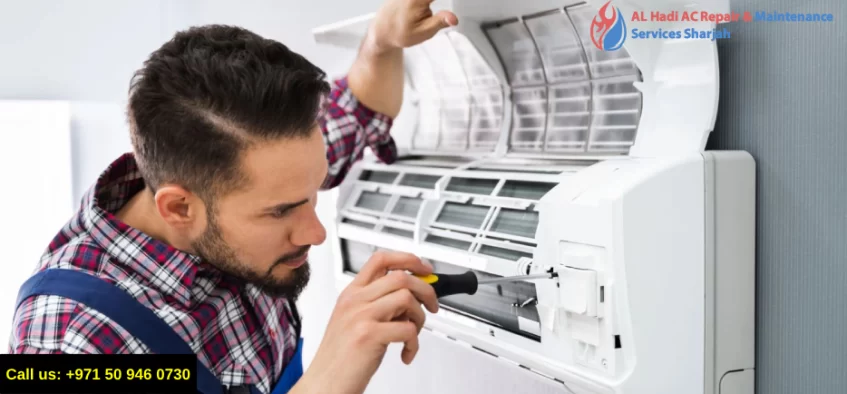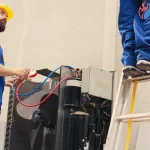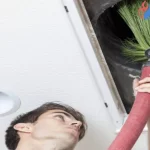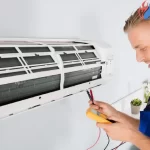
Top 7 Signs Your AC Needs Immediate Repair
Introduction
Top 7 Signs Your AC Needs Immediate Repair? Air conditioners (AC) are essential for keeping your indoor environment cool and comfortable, especially during hot weather. However, like any mechanical system, AC units can develop problems over time, and if these problems are not addressed quickly, they can worsen and lead to costly repairs. Recognizing the signs of AC malfunction early is crucial to avoid further damage and ensure your unit continues to work efficiently. This article discusses the top 7 signs that your AC needs immediate repair.
1. AC Blowing Warm Air Instead of Cool Air
Your AC unit is designed to blow cool air, and if it’s blowing warm or hot air, it’s a clear indication that something is wrong. The root cause could be anything from a refrigerant leak to a faulty compressor, both of which require professional intervention.
Causes of Warm Air from AC:
- Refrigerant Leak: Low refrigerant levels can cause your AC to blow warm air instead of cool air.
- Faulty Compressor: The compressor is responsible for circulating refrigerant through the system. If it’s malfunctioning, your AC won’t cool properly.
- Clogged Condenser Coils: Dirty coils can prevent your AC from cooling effectively.
- Broken Thermostat: A faulty thermostat might misread the temperature and cause the unit to blow warm air.
What to Do:
- Call a Professional Technician: If your AC is blowing warm air, call a technician to check refrigerant levels, the compressor, and other components. Don’t attempt to fix refrigerant issues yourself, as they can be dangerous and require specialized knowledge.
2. Water Leaks or Pooling Water Around the AC Unit
Water leakage around your AC unit can be a serious issue. Air conditioners naturally generate water condensation, but this should be drained away properly. If you notice water pooling around the unit, it indicates a malfunction in the drainage system.
Causes of Water Leaks:
- Clogged Condensate Drain: A blocked drain prevents water from exiting the unit, leading to leaks.
- Frozen Evaporator Coils: If the coils freeze, excess moisture may drip onto the floor.
- Damaged Drain Pan: A crack or damage in the drain pan can cause water to leak out.
What to Do:
- Turn Off the Unit: To prevent further damage, turn off your AC and call a professional to inspect the drainage system.
- Clean the Drain: If the condensate drain is clogged, cleaning it should fix the issue.
3. Unusual Noises Coming from the AC Unit
Your AC should operate relatively quietly. If you start hearing strange noises like banging, buzzing, or rattling, it could indicate a serious issue inside the system.
Causes of Unusual Noises:
- Loose or Broken Parts: A loose fan or a broken belt can cause rattling or buzzing sounds.
- Compressor Issues: A malfunctioning compressor can produce loud, grinding noises.
- Debris in the Unit: Small objects or debris inside the unit can cause strange sounds as the air circulates.
What to Do:
- Turn Off the AC: Turn off your AC immediately to prevent further damage.
- Contact a Professional: Have a technician inspect the internal components, including the fan, motor, and compressor, to diagnose the source of the noise.
4. Foul Odors Coming from the AC Vents
If you notice a musty or burning smell coming from your AC, it is a sign that your system is not working properly. Foul odors can be caused by various factors, including mold growth or electrical issues.
Causes of Bad Smells:
- Mold and Mildew Growth: Excess moisture inside the AC can lead to mold and mildew growth, resulting in a musty odor.
- Burnt Wiring: An electrical problem could cause a burning smell, indicating an issue with the motor or wiring.
- Dirty Air Filters: Clogged or dirty filters can trap dust and allergens, causing a musty smell to emanate from the unit.
What to Do:
- Clean the Filters: Start by cleaning or replacing your air filters to remove any trapped odors.
- Call an HVAC Professional: If the smell persists, contact a professional technician to inspect the system for mold or electrical issues.
5. Weak or Insufficient Airflow
If your AC is running but the airflow feels weak, it may not be effectively cooling the room. Poor airflow can make the unit work harder and increase energy consumption, leading to higher utility bills.
Causes of Weak Airflow:
- Clogged Air Filters: Dirty filters block airflow, reducing the AC’s cooling ability.
- Obstructed Ducts: If your ducts are clogged with dust, dirt, or debris, airflow can be restricted.
- Blower Fan Issues: A malfunctioning blower fan can prevent air from circulating properly.
What to Do:
- Replace Air Filters: Start by replacing or cleaning the filters to improve airflow.
- Check the Ductwork: Have a professional inspect the ducts for blockages.
- Inspect the Blower Fan: If the fan isn’t working correctly, it may need repair or replacement.
6. AC Turns On and Off Frequently (Short-Cycling)
Short-cycling occurs when your AC turns on and off repeatedly without completing a full cooling cycle. This can cause significant wear and tear on the unit, leading to more frequent breakdowns.
Causes of Short-Cycling:
- Low Refrigerant Levels: If your AC is low on refrigerant, it can cause the unit to shut off prematurely.
- Dirty Air Filters: When filters are clogged, they can restrict airflow, leading the AC to short-cycle.
- Thermostat Issues: A faulty thermostat might misread temperatures, causing the AC to turn off prematurely.
- Oversized AC Unit: An AC unit that is too large for the space it’s cooling will frequently short-cycle.
What to Do:
- Check Refrigerant Levels: Have a technician check and refill the refrigerant if necessary.
- Replace Air Filters: Dirty filters should be cleaned or replaced.
- Call an HVAC Technician: A technician will inspect the thermostat and unit size to identify the issue.
7. High Electricity Bills
If your electricity bills spike without any change in your usage, it could be due to an inefficient AC unit. AC units that are not properly maintained or repaired can consume more power to cool the space, leading to higher costs.
Causes of High Energy Consumption:
- Dirty Coils and Filters: When coils and filters are clogged, the AC has to work harder to cool the space.
- Refrigerant Leaks: Low refrigerant levels cause the AC to run longer and consume more energy.
- Faulty Thermostat: If the thermostat is malfunctioning, the AC might be running more than necessary.
What to Do:
- Schedule a Tune-Up: Have a professional clean and inspect your AC for any potential issues.
- Replace Old AC Units: If your unit is old and inefficient, it may be time to replace it with a more energy-efficient model.
FAQs
Q1: How do I know if my AC is low on refrigerant?
Signs of low refrigerant include warm air blowing from the AC, ice buildup on the coils, and the unit running longer than usual without cooling effectively.
Q2: Can I repair my AC myself?
While some minor tasks like cleaning filters can be done by homeowners, most AC repairs require a professional technician to ensure safety and proper function.
Q3: How often should I get my AC serviced?
ACs should be serviced at least once a year, ideally before the start of the cooling season. However, if you experience issues such as those mentioned above, you should seek service immediately.
Q4: What should I do if I hear strange noises from my AC?
Turn off the AC to prevent further damage and call a professional technician to inspect and repair the issue.
Q5: How can I prevent my AC from breaking down?
Regular maintenance, including cleaning filters, checking refrigerant levels, and ensuring proper airflow, can help extend the lifespan of your AC and prevent breakdowns.
Conclusion
Being aware of the top signs that your AC needs immediate repair can save you from costly repairs and ensure that your unit works efficiently for longer. If you experience any of the signs mentioned above, it’s essential to call a professional technician to inspect and repair your AC. Regular maintenance and prompt repairs will keep your system running smoothly, providing you with comfort during the hot months.




